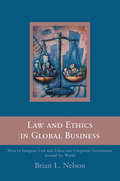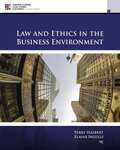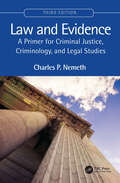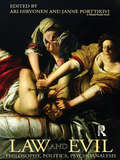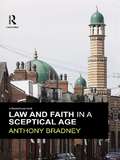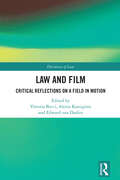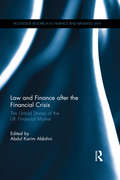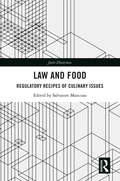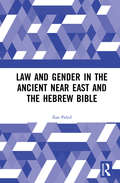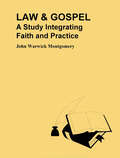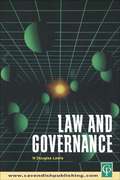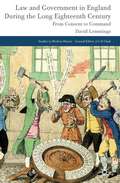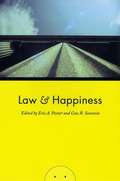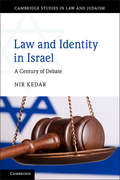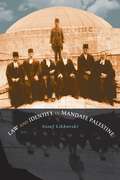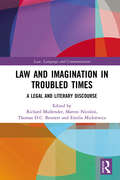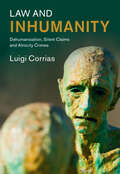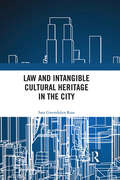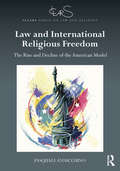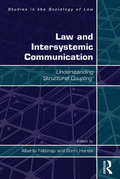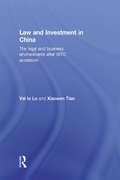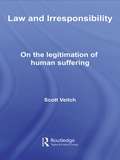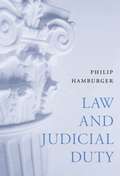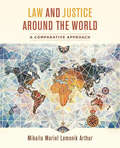- Table View
- List View
Law and Ethics in Global Business: How to Integrate Law and Ethics into Corporate Governance Around the World
by Brian NelsonThis book provides comprehensive and, above all, business focused guidance on the fundamentals of business law and how they should be integrated into ethical and effective business decisions. It concentrates on legal principles and thereby is able to articulate the impact of global business law and its international applications providing a comprehensive overview of the legal and ethical principles which both facilitate and regulate corporate business. This is an ambitious undertaking, yet arguably no more ambitious than the projects undertaken by global business leaders making business decisions around the world. The author combines the expertise of a long-term blue chip law background with the insights of an experienced business educator. Law and Ethics in Global Business is both a comprehensive course book for MBA study and an invaluable business reference source for any executive involved in global business.
Law and Ethics in the Business Environment
by Terry Halbert Elaine IngulliBlend theory with practical applications as LAW AND ETHICS IN THE BUSINESS ENVIRONMENT, 9E presents current controversial issues at the intersection of business, law, and ethics. <p><p>Using an engaging, student-friendly in tone, this edition encourages lively classroom debate on pertinent topics, from climate change to the gig economy to telematic surveillance to transgender workplace rights. The organization and support within this edition make is easy to present topics and encourage insightful thinking. Specific prompts and meaningful assignments engage students and create an interactive classroom environment. <p><p>The authors complete each case and reading with questions that guide students in applying their knowledge in new scenarios as they sharpen critical thinking skills. Projects at the end of each chapter vary from role play and mock trials to negotiation exercises.
Law and Evidence: A Primer for Criminal Justice, Criminology, and Legal Studies
by Charles P. NemethLaw and Evidence: A Primer for Criminal Justice, Criminology, and Legal Studies, Third Edition, introduces the complex topic of evidence law in a straightforward and accessible manner. The use and function of evidence in both criminal and civil cases is examined to offer a complete understanding of how evidence principles play out in the real world of litigation and advocacy. This revised Third Edition includes new discussions of rules and case law analysis, forensic cases and evidentiary software programs. Key features: • Every chapter contains new legal authority that apples to traditional legal principles relevant to evidence law • Offers full coverage of evidentiary codes and statutes • Provides practical forms, checklists and additional tools throughout for use by current and future practitioners Course ancillaries including PowerPointTM lecture slides and an Instructor’s Manual with Test Bank are available with qualified course adoption.
Law and Evil: Philosophy, Politics, Psychoanalysis
by Ari Hirvonen Janne PorttikiviLaw and Evil opens, expands and deepens our understanding of the phenomenon of evil by addressing the theoretical relationship between this phenomenon and law. Hannah Arendt said 'the problem of evil will be the fundamental question of post-war intellectual life in Europe'. This statement is, unfortunately, more than valid in the contemporary world: not only in the events of war, crimes against humanity, terror, repression, criminality, violence, torture, human trafficking, and so on; but also as evil is used rhetorically to condemn these acts, to categorise their perpetrators, and to justify forcible measures, both in international and domestic politics and law. But what is evil? Evil as a concept is too often taken as something that is self-evident, something that is always already defined. Taking Kant’s concept of radical evil as a starting point, this volume counters such a tendency. Bringing together philosophical, political, and psychoanalytical perspectives, in analysing both the concept and the phenomenon of evil, the contributors to this volume offer a rich and thoroughgoing analysis of the multifaceted phenomenon of evil and its relationship to law.
Law and Faith in a Sceptical Age
by Anthony BradneyLaw and Faith in a Sceptical Age is an analysis of the legal position of religious believers in a dominantly secular society. Great Britain is a society based upon broadly liberal principles. It claims to recognise the needs of religious believers and to protect them from discrimination. But whilst its secular ideology pervades public discourse, the vestigial remains of a Christian, Protestant past are seen in things as varied as the structure of public holidays and the continued existence of established churches in both England and Scotland. Religious, Christian values also form the starting point for legal rules relating to matters such as marriage. Active religious communities constitute a very small minority of the population; however, those who belong to them often see their religion as being the most important element of their identity. Yet the world-view of these communities is frequently at odds with both the prevailing liberal, secular climate of Great Britain and its Christian, Anglican past. This necessarily entails a clash of ideologies that puts in question the secular majority's claim to want to protect religious minorities, the possibility of it being able to sufficiently understand the needs of those minorities and the desirability or practicality of any accommodation between the needs of the various religious communities and the secular mainstream of society. Law and Faith in a Sceptical Age addresses these issues by raising the question of whether a liberal, secular state can protect religion. Accommodation to different religious traditions forms part of the history of the legal systems of Britain. This book asks whether further accommodation can and should be made.
Law and Film: Critical Reflections on a Field in Motion (Discourses of Law)
by Vittoria Becci Alexia Katsiginis Edward Van DaalenThis book explores how law can be understood through film by engaging creatively with the intellectual and aesthetic dimensions of both fields.Challenged to go beyond an instrumental analysis of a law "and" film, the contributors to this book instead consider instead the need to turn to film and what this means for how we come to understand law and its absences. The chapters explore a variety of narratives, aesthetics, cinematic epistemologies and legal phenomena; from assessing law in social debates to film as legal critique, from notions of justice to contemplations on evil, and from masculine vigilantism to radical feminism. Taken together, they constitute an inspiring body of work that embodies an urgency for diverse and subversive ways to challenge law’s formalism and authority; and to think about and respond variously to law’s impotence, its disappointment, or its boredom.This book will appeal to legal scholars and students in law and the humanities, especially those with interests in aesthetics, law and literature, law and culture, law and society, and critical legal theory.
Law and Finance after the Financial Crisis: The Untold Stories of the UK Financial Market (Routledge Research in Finance and Banking Law)
by Abdul Karim AldohniThe 2008 financial crisis has become one of the defining features of the twenty first century’s first decade. The series of events which unfolded in the aftermath of the crisis has exposed major structural flaws in many of the financial systems around the globe, triggering a global call for legal and regulatory reforms to address the problems that have been uncovered. This book deals with a neglected angle of the 2008 financial crisis looking in-depth at the implicit effects of the 2008 crisis on the UK financial market. The book considers new trends in finance which have emerged since the crisis as well as the challenges faced by some older practices in the UK financial markets. After providing a reflective account of the history of law and creditors in the UK the book investigates the proliferation of certain forms of financing that have recently become very visible parts of the UK financial market’s structure, such as high cost short term lending and peer to peer lending. It provides legal and economic accounts of these forms of alternative lending, charting their developments, current status and critically assesses their impact on the UK financial market. Also examined are the ongoing funding difficulties faced by Small and Medium Enterprises (SMEs) and the suitability of the UK current legal framework to support these institutions. The book goes on to look at the viability and safety of some other post crisis trends such as banks use of Contingent Convertible Bonds (CoCos) to improve their resilience.
Law and Food: Regulatory Recipes of Culinary Issues (Juris Diversitas)
by Salvatore MancusoThis book presents a range of insights on the relationship between food and law. Over time, religions have multiplied food prohibitions and prescriptions, customs have redistributed land, shared its occupancy in creative ways, or favoured communal property so that everyone could have access to food. In turn, laws have multiplied to facilitate food trade, security, safety, traceability, and also to promote and protect food and wine production, using trademarks and geographical denominations. This volume brings a comparative and interdisciplinary approach to examine some of the most heavily debated issues in the interaction between food, in all forms, and the law. Topics covered include food security, food safety, food quality, intellectual property, and consumer protection. As well as highlighting current issues, the work also points to new challenges in this field. The book will be a valuable resource for researchers and policy-makers working in the area of Food Law and Comparative Law.
Law and Gender in the Ancient Near East and the Hebrew Bible
by Ilan PeledThis volume examines how gender relations were regulated in ancient Near Eastern and biblical law. The textual corpus examined includes the various pertinent law collections, royal decrees and instructions from Mesopotamia and Hatti, and the three biblical legal collections. Peled explores issues beginning with the wide societal perspective of gender equality and inequality, continues to the institutional perspective of economy, palace and temple, the family, and lastly, sex crimes. All the texts mentioned or referred to in the book are given in an appendix, both in the original languages and in English translation, allowing scholars to access the primary sources for themselves. Law and Gender in the Ancient Near East and the Hebrew Bible offers an invaluable resource for anyone working on Near Eastern society and culture, and gender in the ancient world more broadly.
Law and Gospel: A Study Integrating Faith and Practice
by John Warwick MontgomeryA monograph integrating the study of law with the study of Christian theology. Starting with an examination of the three classical functions of the law (political, paedogogical, and didactic), and the distinctions between law and gospel the study moves on to examine contracts, criminal law, real and personal property, laws of evidence, and civil and constitutional law.
Law and Governance
by N. Douglas LewisThis book describes the nature of these changes and identifies the accountability gaps which have inevitably opened up in the absence of a written constitution or a considered Administrative Procedure Act.
Law and Government in England during the Long Eighteenth Century
by David LemmingsOver the long eighteenth century English governance was transformed by large adjustments to the legal instruments and processes of power. This book documents and analyzes these shifts and focuses upon the changing relations between legal authority and the English people.
Law and Happiness
by Cass R. Sunstein Eric A. PosnerSince the earliest days of philosophy, thinkers have debated the meaning of the term happiness and the nature of the good life. But it is only in recent years that the study of happiness- or "hedonics"- has developed into a formal field of inquiry, cutting across a broad range of disciplines and offering insights into a variety of crucial questions of law and public policy. Law and Happiness brings together the best and most influential thinkers in the field to explore the question of what makes up happiness--and what factors can be demonstrated to increase or decrease it. Martha Nussbaum offers an account of the way that hedonics can productively be applied to psychology, Cass R. Sunstein considers the unexpected relationship between happiness and health problems, Matthew Adler and Eric A. Posner view hedonics through the lens of cost-benefit analysis, David A. Weisbach considers the relationship between happiness and taxation, and Mark A. Cohen examines the role crime--and fear of crime--can play in people's assessment of their happiness, and much more. The result is a kaleidoscopic overview of this increasingly prominent field, offering surprising new perspectives and incisive analyses that will have profound implications on public policy.
Law and Identity in Colonial South Asia
by Mitra SharafiThis book explores the legal culture of the Parsis, or Zoroastrians, an ethnoreligious community unusually invested in the colonial legal system of British India and Burma. Rather than trying to maintain collective autonomy and integrity by avoiding interaction with the state, the Parsis sank deep into the colonial legal system itself. From the late eighteenth century until India's independence in 1947, they became heavy users of colonial law, acting as lawyers, judges, litigants, lobbyists, and legislators. They de-Anglicized the law that governed them and enshrined in law their own distinctive models of the family and community by two routes: frequent intra-group litigation often managed by Parsi legal professionals in the areas of marriage, inheritance, religious trusts, and libel, and the creation of legislation that would become Parsi personal law. Other South Asian communities also turned to law, but none seems to have done so earlier or in more pronounced ways than the Parsis.
Law and Identity in Israel: A Century of Debate (Cambridge Studies in Law and Judaism)
by Nir KedarWhat makes Israeli law Israeli? Why is the word 'Jewish' almost entirely absent from Israeli legislation? How did Israel succeed in eluding a futile and dangerous debate over identity, and construct a progressive, independent, original and sophisticated legal system? Law and Identity in Israel attempts to answer these questions by looking at the complex bond between Zionism and the Jewish culture. Forging an original and 'authentic' Israeli law that would be an expression and encapsulation of Israeli-Jewish identity has been the goal of many Jewish and Zionist jurists as well as public leaders for the past century. This book chronicles and analyzes these efforts, and in the process tackles the complex meaning of Judaism in modern times as a religion, a culture, and a nationality. Nir Kedar examines the challenges and difficulties of expressing Judaism, or transplanting it into, the laws of the state of Israel.
Law and Identity in Mandate Palestine
by Assaf LikhovskiOne of the major questions facing the world today is the role of law in shaping identity and in balancing tradition with modernity. In an arid corner of the Mediterranean region in the first decades of the twentieth century, Mandate Palestine was confronting these very issues. Assaf Likhovski examines the legal history of Palestine, showing how law and identity interacted in a complex colonial society in which British rulers and Jewish and Arab subjects lived together. Law in Mandate Palestine was not merely an instrument of power or a method of solving individual disputes, says Likhovski. It was also a way of answering the question, "Who are we?" British officials, Jewish lawyers, and Arab scholars all turned to the law in their search for their identities, and all used it to create and disseminate a hybrid culture in which Western and non-Western norms existed simultaneously. Uncovering a rich arsenal of legal distinctions, notions, and doctrines used by lawyers to mediate between different identities, Likhovski provides a comprehensive account of the relationship between law and identity. His analysis suggests a new approach to both the legal history of Mandate Palestine and colonial societies in general.
Law and Imagination in Troubled Times: A Legal and Literary Discourse (Law, Language and Communication)
by Richard MullenderThis collection focuses on how troubled times impact upon the law, the body politic, and the complex interrelationship among them. It centres on how they engage in a dialogue with the imagination and literature, thus triggering an emergent (but thus far underdeveloped) field concerning the ‘legal imagination.’ Legal change necessitates a close examination of the historical, cultural, social, and economic variables that promote and affect such change. This requires us to attend to the variety of non-legal variables that percolate throughout the legal system. The collection probes ‘the transatlantic constitution’ and focuses attention on imagination in a common law context that seems to foster imagination as a cultural capability. The book is divided into four parts. The first part begins with a set of insights into the historical development of legal education in England and concludes with a reflection on the historical transition of England from an absolute monarchy to a republic. The second part of the volume examines the role that imagination plays in the functioning of the courts. The third part focuses on patterns of thought in legal scholarship and detects how legal imagination contributes to the process of producing new legal categories and terminology. The fourth part focuses on patterns of thought in legal scholarship, and looks to the impact of the imagination on legal thinking in the future. The work provides stimulating reading for those working in the areas of legal philosophy, legal history and law and humanities and law and language.
Law and Inhumanity: Dehumanization, Silent Claims and Atrocity Crimes (Law in Context)
by Luigi CorriasIn Law and Inhumanity, Luigi Corrias explores fundamental philosophical issues underlying the law and politics of atrocity crimes within international criminal justice. Focusing on understanding the experiences of victims and perpetrators, Corrias draws on numerous disciplines to construct his conceptual framework while also using several case studies to examine important issues including references to 'humanity' in the discourse on atrocity crimes; the need for a first-person plural perspective of a 'We' within international criminal justice; the experiences of dehumanization of both victims and perpetrators; the temporalities of suffering and justice; and the tension between individual criminal responsibility and structural violence.
Law and Intangible Cultural Heritage in the City
by Sara Gwendolyn RossWith disappearing music venues, and arts and culture communities at constant risk of displacement in our urban centers, the preservation of intangible cultural heritage is of growing concern to global cities. This book addresses the role and protection of intangible cultural heritage in the urban context. Using the methodology of Urban Legal Anthropology, the author provides an ethnographic account of the civic effort of Toronto to become a Music City from 2014-18 in the context of redevelopment and gentrification pressures. Through this, the book elucidates the problems cities like Toronto have in equitably protecting intangible cultural heritage and what can be done to address this. It also evaluates the engagement that Toronto and other cities have had with international legal frameworks intended to protect intangible cultural heritage, as well as potential counterhegemonic uses of hegemonic legal tools. Understanding urban intangible cultural heritage and the communities of people who produce it is of importance to a range of actors, from urban developers looking to formulate livable and sustainable neighbourhoods, to city leaders looking for ways in which their city can flourish, to scholars and individuals concerned with equitability and the right to the city. This book is the beginning of a conservation about what is important for us to protect in the city for future generations beyond built structures, and the role of intangible cultural heritage in the creation of full and happy lives. The book is of interest to legal and sociolegal readers, specifically those who study cities, cultural heritage law, and legal anthropology.
Law and International Religious Freedom: The Rise and Decline of the American Model (ICLARS Series on Law and Religion)
by Pasquale AnnicchinoThis book analyzes the promotion and protection of freedom of religion in the international arena with a particular focus on the role and influence of the US International Religious Freedom Act, 1998. It also investigates the impact of the IRFA on the legislation and policies of third countries and the EU. The book develops the story of the protection of religious freedom through foreign policy by showing how religious laws affect and shape a more communitarian dimension of the notion of freedom of religion which stands in contrast with a traditionally Western individualistic understanding of the right. It is argued that it is still possible to defend the unstable category of freedom of religion or belief especially when major violations are at stake. The book presents a balanced contribution to the academic debate on the promotion and protection of religious freedom. The comparative approach and interdisciplinary methodology make it a valuable resource for academics, students and policy-makers in Law, International Relations and Strategic Studies.
Law and Intersystemic Communication: Understanding ‘Structural Coupling’ (Studies In The Sociology Of Law Ser.)
by Gorm HarsteWith contributions from experts in the field of sociology of law, this book provides an overview of current perspectives on socio-legal studies. It focuses particularly on the relationship between law and society described in recent social systems theory as ’structural coupling’. The first part of the book presents a reconstruction of theoretical tendencies in the field of socio-legal studies, characterised by the emergence of a transnational model of legal systems no longer connected to territorial borders and culturally specific aspects of single legal orders. In the following parts of the book, the contributions analyse some concrete cases of interrelation between law and society from an empirical and theoretical perspective.
Law and Investment in China: The Legal and Business Environment after China's WTO Accession
by Xiaowen Tian Vai Io LoThe Chinese market is appealing, but the Chinese legal system is very complicated. A basic understanding of Chinese law is absolutely crucial for companies investing in this fast-growing and potentially huge market. Since China is moving toward a socialist market economy and is increasingly integrated into the world market, some aspects of China's commercial law are different from, while others are moving into line with, those of mature market economies. This book provides an introduction to the Chinese legal system, focusing on laws and regulations on foreign direct investment and highlights recent government policies and measures undertaken to intensify economics reforms so as to meet various challenges arising from China's accession to the World Trade Organization.
Law and Irresponsibility: On the Legitimation of Human Suffering
by Scott VeitchLaw is widely assumed to provide contemporary society with its most important means of organizing responsibility. Across a broad range of areas of social life – from the activities of states and citizens, to work, business and private relationships – it is understood that legal regulation plays a crucial role in defining and limiting responsibilities. But Law and Irresponsibility pursues the opposite view: it explores how law organizes irresponsibility. With a particular focus on large-scale harms – including extensive human rights violations, forms of colonialism, and environmental or nuclear devastation – this book analyzes the ways in which law legitimates human suffering by demonstrating how legal institutions operate as much to deflect responsibility for harms suffered as to acknowledge them. Drawing on a series of case studies, it shows not only how law facilitates the dispersal and disavowal of responsibility, but how it does so in consistent and patterned ways. Irresponsibility is organized, and its organization is traced here to the legal forms, and the social and political conditions, that sustain ‘our’ complicity in human suffering. This innovative and interdisciplinary book provides a radical challenge to conventional thinking about law and legal institutions. It will be of considerable interest to those working in law, political and legal theory, sociology and moral philosophy.
Law and Judicial Duty
by Philip HamburgerPhilip Hamburger’s Law and Judicial Duty traces the early history of what is today called “judicial review.” Working from previously unexplored evidence, Hamburger questions the very concept of judicial review. Although decisions holding statutes unconstitutional are these days considered instances of a distinct judicial power of review, Hamburger shows that they were once understood merely as instances of a broader judicial duty. The book’s focus on judicial duty overturns the familiar debate about judicial power. The book is therefore essential reading for anyone concerned about the proper role of the judiciary. Hamburger lays the foundation for his argument by explaining the common law ideals of law and judicial duty. He shows that the law of the land was understood to rest on the authority of the lawmaker and that what could not be discerned within the law of the land was not considered legally binding. He then shows that judges had a duty to decide in accord with the law of the land. These two ideals—law and judicial duty—together established and limited what judges could do. By reviving an understanding of these common law ideals, Law and Judicial Duty calls into question the modern assumption that judicial review is a power within the judges’ control. Indeed, the book shows that what is currently considered a distinct power of review was once understood as a matter of duty—the duty of judges to decide in accord with the law of the land. The book thereby challenges the very notion of judicial review. It shows that judges had authority to hold government acts unconstitutional, but that they enjoyed this power only to the extent it was required by their duty. In laying out the common law ideals, and in explaining judicial review as an aspect of judicial duty, Law and Judicial Duty reveals a very different paradigm of law and of judging than prevails today. The book, moreover, sheds new light on a host of misunderstood problems, including intent, manifest contradiction, the status of foreign and international law, the cases and controversies requirement, and the authority of judicial precedent.
Law and Justice around the World: A Comparative Approach
by Mikaila Mariel ArthurLaw and Justice around the World is designed to introduce students to comparative law and justice, including cross-national variations in legal and justice systems as well as global and international justice. The book draws students into critical discussions of justice around the world today by: taking a broad perspective on law and justice rather than limiting its focus to criminal justice systemsexamining topics of global concern, including governance, elections, environmental regulations, migration and refugee status, family law, and others focusing on a diverse set of global examples, from Europe, North America, East Asia, and especially the global south, and comparing the United States law and justice system to these other nations continuing to cover core topics such as crime, law enforcement, criminal courts, and punishmentincluding chapter goals to define learning outcomessharing case studies to help students apply concepts to real life issues Instructor resources include discussion questions; suggested readings, films, and web resources; a test bank; and chapter-by-chapter PowerPoint slides with full-color maps and graphics. By widening the comparative lens to include nations that are often completely ignored in research and teaching, the book paints a more realistic portrait of the different ways in which countries define and pursue justice in a globalized, interconnected world.
